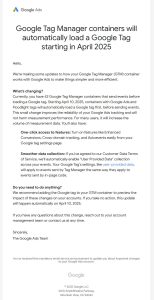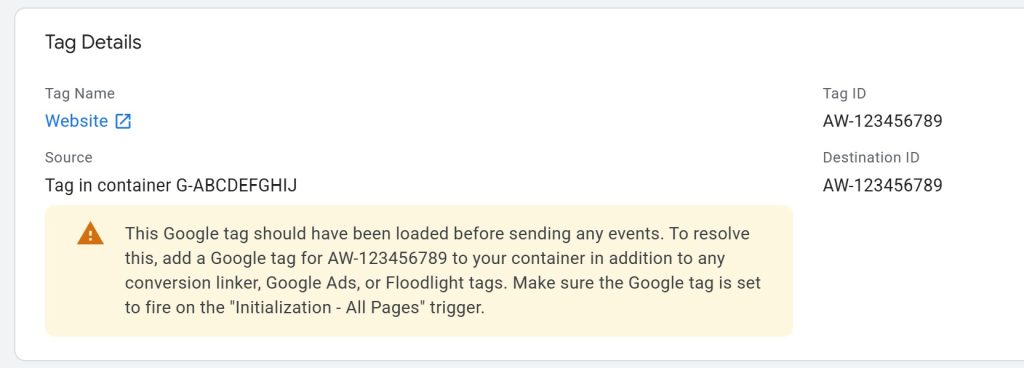Executive Summary
As mentioned in the recent email from Google and on the GTM Official Release Notes, starting April 10, 2025, Google Tag Manager (GTM) will automatically load the Google tag (gtag.js) for containers using Google Ads and Floodlight tags. This change is intended to ensure more reliable conversion tracking and to provide Google’s algorithms with what should be richer, more accurate data signals. It also enables automatic collection of User-Provided Data (hashed emails and other identifiers) for Enhanced Conversions, if previously enabled. As our client, we’ll proactively handle and optimize these changes to align with your business and marketing needs.

Our Recommendation
To avoid potential slight delays in conversion tracking and maximize measurement accuracy, we recommend explicitly configuring your Google Ads and Floodlight tags through GTM’s Google tag. We will individually review each client’s setup to determine the optimal configuration, including which specific events should remain active, based on your unique goals and privacy considerations.
Technical Changes You Should Know
Google Tag Automatically Loads Before Conversions
Previously, the Google tag (gtag.js) was loaded asynchronously when conversion or remarketing tags fired, which limited certain tracking features. GTM will now automatically ensure the Google tag loads synchronously before firing Google Ads tags, enabling all conversion and remarketing features to function fully.
Potential Delay in Tag Firing
Since the Google tag will now load synchronously before conversion events fire, minor delays may occur. However, manually implementing the Google tag helps reduce the chance of delays caused by synchronous loading at the moment a conversion is triggered. It also ensures consistent performance and gives you full control over tag timing and behavior.
More Signals to Google Ads
With this change, Google Ads will receive additional event signals by default. Unless explicitly adjusted in your gtag configuration, this increased data may influence Google’s algorithmic optimization and potentially improve ad campaign performance. However, in certain cases-especially where false or noisy events are automatically triggered – we believe these extra signals could negatively impact campaign optimization by sending misleading data into the system.
Enhanced Conversion Tracking
If enabled, Enhanced Conversions will automatically collect hashed user data (such as email addresses) to improve conversion matching accuracy. It’s important to ensure your organization’s privacy policies are aligned with this data collection process – and if not, to actively disable the feature in your tag settings.
Why Is Google Making This Change?
Google stated that this change aims to improve the reliability of Google Ads tracking and will not harm measurement performance. According to Google, many users may experience an increase in measurement data volume.
This is probably intended to provide richer data signals for Google’s machine learning algorithms, potentially improving campaign performance and measurement clarity. That said, the actual impact depends on the quality of the events being sent.
GTM Behavior: Before vs. After April 2025 Change
| Scenario | Before April 2025 | After April 2025 |
| Conversion tag without global tag | GTM auto-loads minimal gtag.js, limited features | GTM auto-loads fully configured gtag.js with all features enabled |
| Global tag already present | Conversion events fired normally | No change – existing global tag is used |
| Automatic events (examples: scroll, link click…) | Not sent by auto-loaded minimal tag | Automatically enabled if configured |
| Enhanced Conversions (User Data) | Not captured unless explicitly set up | Automatically captured if enabled |
| Tag firing order and timing | Immediate firing without verifying global tag load | Conversion events wait for global tag load completion |
| Recommended GTM setup | Manual global tag configuration often skipped | Manual global tag setup strongly recommended for full control |

As always, we’re here to ensure these changes enhance your data-driven strategies seamlessly.
Feel free to reach out to us with any questions or concerns – whether it’s about this update, your current tracking setup, or anything else related to analytics and marketing tech. We’re happy to help.
